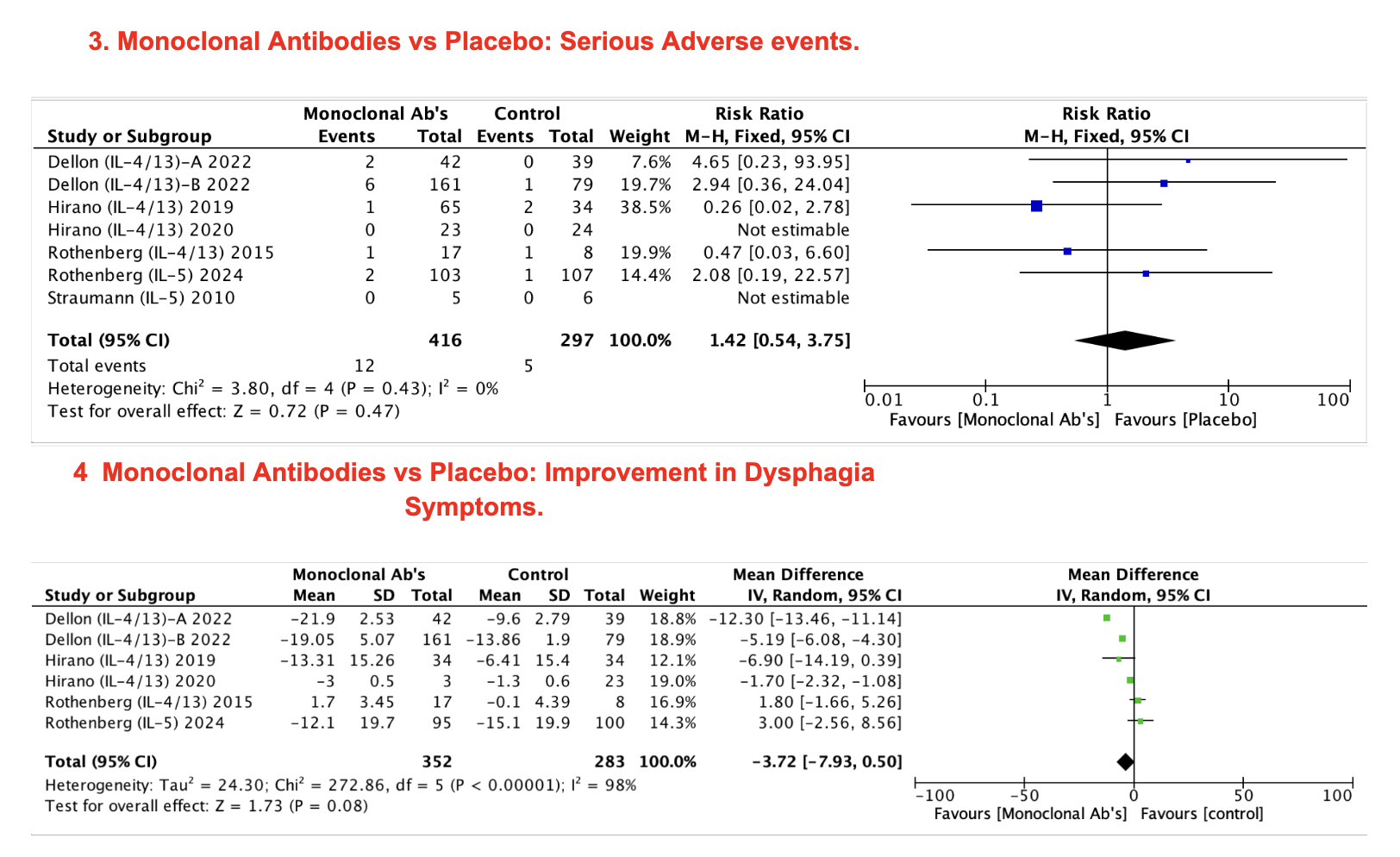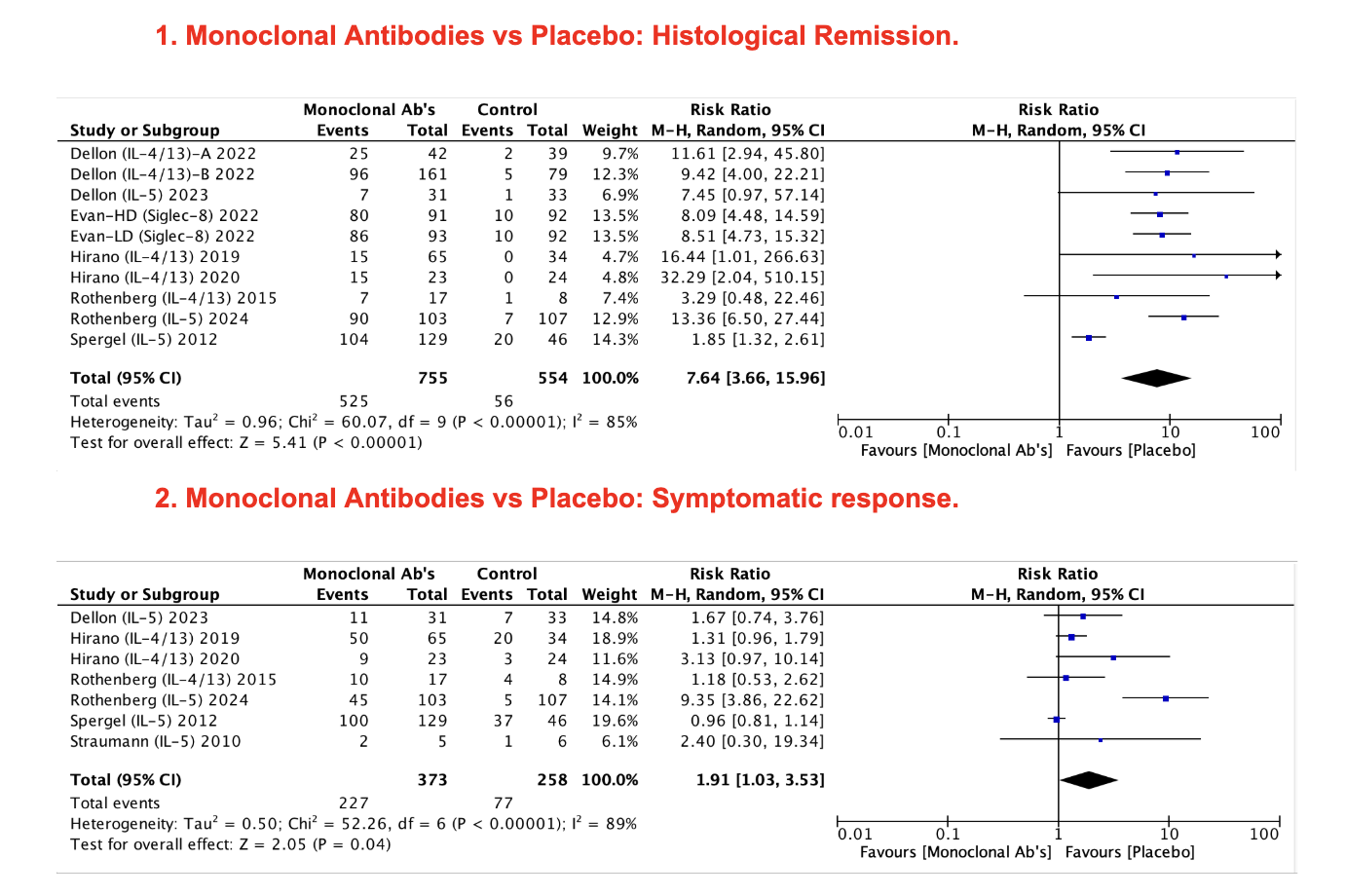Sunday Poster Session
Category: Esophagus
P0622 - Therapeutic Role of Monoclonal Antibodies in Eosinophilic Oesophagitis: A Comprehensive Meta-Analysis
Sunday, October 26, 2025
3:30 PM - 7:00 PM PDT
Location: Exhibit Hall
- SD
Simranpreet Singh S. Daid, MBBS, MD
Roger Williams Medical Center
Providence, RI
Presenting Author(s)
Simranpreet S. Daid, MBBS, MD1, Harkanwar Sandhu, MBBS2, Anubhuti Sharma, MBBS, MD3, Pratyush Sachdeva, MBBS, MD4, Arundhati Sharma, MBBS, MD3, Nayanika Tummala, MD5, Sagal Pannu, MBBS, MD6, Saravgunjit Singh Daid, MBBS, MD7
1Roger Williams Medical Center, Providence, RI; 2Park Hospital, Ambala, Haryana, India; 3Guthrie Robert Packer Hospital, Sayre, PA; 4McLaren Bay Region Hospital, Bay City, MI; 5St. Mary's General Hospital, New York Medical College, Poughkeepsie, NY; 6University of Oklahoma College of Medicine, Oklahoma City, OK; 7LSU Health, Shreveport, Shreveport, LA
Introduction: Advances in the immunopathology of Eosinophilic esophagitis have driven the development of monoclonal antibody therapies targeting key inflammatory pathways. This meta-analysis compiles evidence from randomized controlled trials to evaluate the efficacy and safety of monoclonal antibodies in the treatment of EoE.
Methods: We systematically searched PubMed, Google Scholar, Embase and ClinicalTrials.gov proceedings through March 2025 to identify RCTs comparing monoclonal antibodies with placebo in patients with active Eosinophilic esophagitis. Data was extracted into a spreadsheet and the meta-analysis was performed using RevMan 5.4. Outcomes assessed included histologic remission (defined as ≤15 eosinophils/high-power-field), symptomatic response, change in dysphagia scores, and serious adverse events (SAE). Pooled risk ratios (RR) and mean differences (MD) were calculated using random-effects models, with heterogeneity assessed using the I² statistic.
Results: Ten RCTs comprising 1,320 patients met inclusion criteria. Monoclonal antibodies significantly increased the rate of histologic remission compared to placebo (RR 7.64; 95% CI 3.66–15.96; I² = 85%). Symptomatic response was also greater with monoclonal antibodies (RR 1.91; 95% CI 1.03–3.55; I² = 89%). Pooled analysis of change in dysphagia scores demonstrated a non-significant trend favouring monoclonal antibodies (MD −3.72; 95% CI −7.93 to 0.50; I² = 98%). Rates of SAEs were low and not significantly different between groups (RR 1.42; 95% CI 0.54–3.75; I² = 0%).
Discussion: Monoclonal antibodies demonstrate significant efficacy in achieving histologic remission and improving symptomatic response in patients with Eosinophilic esophagitis without an increase in serious adverse events. These findings support their potential role as effective therapeutic agents in Eosinophilic esophagitis management. Further long-term studies are warranted to evaluate durability of response and optimal treatment strategies.

Figure: Figure 1. Monoclonal Antibodies vs Placebo: Histological Remission.
Figure 2. Monoclonal Antibodies vs Placebo: Symptomatic response.

Figure: Figure 3. Monoclonal Antibodies vs Placebo: Serious Adverse events.
Figure 4. Monoclonal Antibodies vs Placebo: Improvement in Dysphagia Symptoms.
Disclosures:
Simranpreet Daid indicated no relevant financial relationships.
Harkanwar Sandhu indicated no relevant financial relationships.
Anubhuti Sharma indicated no relevant financial relationships.
Pratyush Sachdeva indicated no relevant financial relationships.
Arundhati Sharma indicated no relevant financial relationships.
Nayanika Tummala indicated no relevant financial relationships.
Sagal Pannu indicated no relevant financial relationships.
Saravgunjit Singh Daid indicated no relevant financial relationships.
Simranpreet S. Daid, MBBS, MD1, Harkanwar Sandhu, MBBS2, Anubhuti Sharma, MBBS, MD3, Pratyush Sachdeva, MBBS, MD4, Arundhati Sharma, MBBS, MD3, Nayanika Tummala, MD5, Sagal Pannu, MBBS, MD6, Saravgunjit Singh Daid, MBBS, MD7. P0622 - Therapeutic Role of Monoclonal Antibodies in Eosinophilic Oesophagitis: A Comprehensive Meta-Analysis, ACG 2025 Annual Scientific Meeting Abstracts. Phoenix, AZ: American College of Gastroenterology.
1Roger Williams Medical Center, Providence, RI; 2Park Hospital, Ambala, Haryana, India; 3Guthrie Robert Packer Hospital, Sayre, PA; 4McLaren Bay Region Hospital, Bay City, MI; 5St. Mary's General Hospital, New York Medical College, Poughkeepsie, NY; 6University of Oklahoma College of Medicine, Oklahoma City, OK; 7LSU Health, Shreveport, Shreveport, LA
Introduction: Advances in the immunopathology of Eosinophilic esophagitis have driven the development of monoclonal antibody therapies targeting key inflammatory pathways. This meta-analysis compiles evidence from randomized controlled trials to evaluate the efficacy and safety of monoclonal antibodies in the treatment of EoE.
Methods: We systematically searched PubMed, Google Scholar, Embase and ClinicalTrials.gov proceedings through March 2025 to identify RCTs comparing monoclonal antibodies with placebo in patients with active Eosinophilic esophagitis. Data was extracted into a spreadsheet and the meta-analysis was performed using RevMan 5.4. Outcomes assessed included histologic remission (defined as ≤15 eosinophils/high-power-field), symptomatic response, change in dysphagia scores, and serious adverse events (SAE). Pooled risk ratios (RR) and mean differences (MD) were calculated using random-effects models, with heterogeneity assessed using the I² statistic.
Results: Ten RCTs comprising 1,320 patients met inclusion criteria. Monoclonal antibodies significantly increased the rate of histologic remission compared to placebo (RR 7.64; 95% CI 3.66–15.96; I² = 85%). Symptomatic response was also greater with monoclonal antibodies (RR 1.91; 95% CI 1.03–3.55; I² = 89%). Pooled analysis of change in dysphagia scores demonstrated a non-significant trend favouring monoclonal antibodies (MD −3.72; 95% CI −7.93 to 0.50; I² = 98%). Rates of SAEs were low and not significantly different between groups (RR 1.42; 95% CI 0.54–3.75; I² = 0%).
Discussion: Monoclonal antibodies demonstrate significant efficacy in achieving histologic remission and improving symptomatic response in patients with Eosinophilic esophagitis without an increase in serious adverse events. These findings support their potential role as effective therapeutic agents in Eosinophilic esophagitis management. Further long-term studies are warranted to evaluate durability of response and optimal treatment strategies.

Figure: Figure 1. Monoclonal Antibodies vs Placebo: Histological Remission.
Figure 2. Monoclonal Antibodies vs Placebo: Symptomatic response.

Figure: Figure 3. Monoclonal Antibodies vs Placebo: Serious Adverse events.
Figure 4. Monoclonal Antibodies vs Placebo: Improvement in Dysphagia Symptoms.
Disclosures:
Simranpreet Daid indicated no relevant financial relationships.
Harkanwar Sandhu indicated no relevant financial relationships.
Anubhuti Sharma indicated no relevant financial relationships.
Pratyush Sachdeva indicated no relevant financial relationships.
Arundhati Sharma indicated no relevant financial relationships.
Nayanika Tummala indicated no relevant financial relationships.
Sagal Pannu indicated no relevant financial relationships.
Saravgunjit Singh Daid indicated no relevant financial relationships.
Simranpreet S. Daid, MBBS, MD1, Harkanwar Sandhu, MBBS2, Anubhuti Sharma, MBBS, MD3, Pratyush Sachdeva, MBBS, MD4, Arundhati Sharma, MBBS, MD3, Nayanika Tummala, MD5, Sagal Pannu, MBBS, MD6, Saravgunjit Singh Daid, MBBS, MD7. P0622 - Therapeutic Role of Monoclonal Antibodies in Eosinophilic Oesophagitis: A Comprehensive Meta-Analysis, ACG 2025 Annual Scientific Meeting Abstracts. Phoenix, AZ: American College of Gastroenterology.
